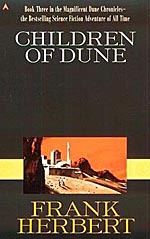
![]() Bormgans
Bormgans
8/17/2020
![]()
"The landscape which met their gaze was beyond pity, nowhere did it pause - no hesitations in it at all."
There is something relentless to Children of Dune. It was the most difficult hurdle yet in my project of rereading the entire series.
It is a bit of a surprise this became "the first hardcover best-seller ever in the science fiction field" and also won the 1977 Hugo, because there is undeniably truth in David Pringle's assessment of the book being "convoluted stuff."
There's a paradox to this very review and how it determined my reading experience, and it has to do with that convolutedness. Because I knew I wanted to write this text, I read Children carefully - maybe too carefully, taking notes, trying to figure things out. Especially in the second half of the book, that left me gasping for air at times, unable to figure out what Herbert wanted to do, lost in the mystical ramblings about visions and futures, focusing on inconsistencies or what I thought were inconsistencies. It took a bit of joy out of reading.
At the same time, I did like the overall plot a lot, and could see Herbert had actually managed to tell yet another great story with perfect pacing, especially when the action kicked in: his characteristic style of cutting between short scenes with lots of dialogue somehow delivered the goods again. All that left me with about a 3 out of 5 stars tally, a bit in line with when I first read the series, and I then thought book 2 and 3 were the weakest of the six.
But when I started to reread (and reread and reread) all the quotes I had marked to get a better grip on the book's difficult stuff, I actually understood more of it, and most inconsistencies dissolved. So yes, this review at times wrecked my reading - instead of just riding the flow, I focused too much on trying to understand - but in the end it also reconciled me with the book. That leaves me with a 3.5, maybe 4 star rating, because I still think Herbert could have cut back some on the mystic philosophy, without actually hurting its core.
In what follows, I first tried to write something of a review of the book: strengths, weaknesses, characters, you know the drill. I primarily focus on Alia as tragic figure, and also discuss an important thing that remains unclear & possibly inconsistent: Paul's relationship to the Golden Path.
For those that want to dive in even deeper, after that first part, I zoom in on four very specific subjects: how I think 'change' is the central concept of this book, the prevalence of a Nietzschean Amor Fati, the book's relationship with Nietzsche's morality beyond good & evil, and finally, free will and its relation to Leto II's specific version of prescience.
Both parts are a spoiler bonanza, but I guess this kind of writing will not appeal to those who haven't read the books anyway.
The text is heavy with quotes, but I wrote it so that you can still follow the logic if you skip them - except once, and I'll warn you there. The quotes are for the die-hards. I had 9504 words selected out of the book, of which I used about 6200. Add to that my own 4400 words, and abracadabra ...another long read, totaling 10630 words. It is what it is, I couldn't help it. A full, thorough discussion of the book needed those.
(...)
Full review on Weighing A Pig
https://schicksalgemeinschaft.wordpress.com/2020/08/17/children-of-dune-frank-herbert-1976/